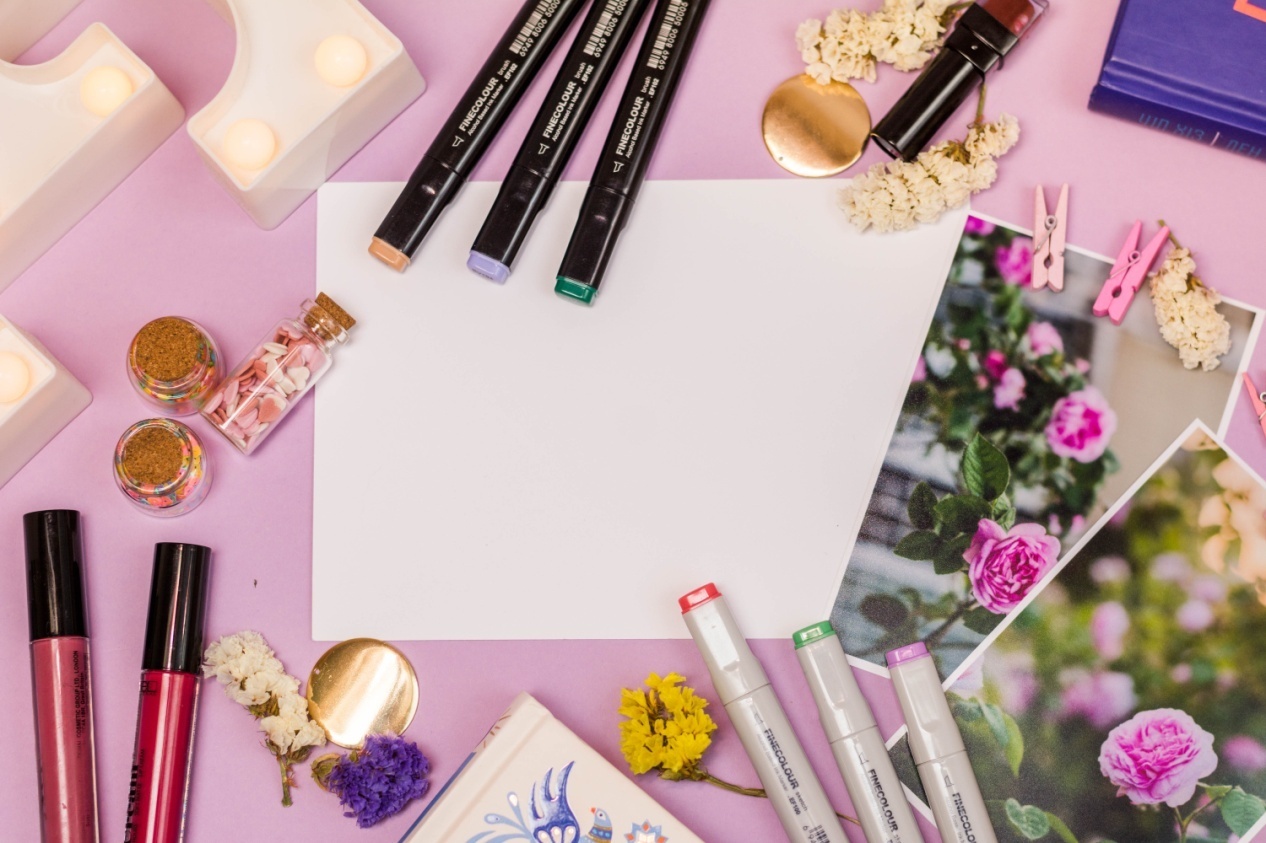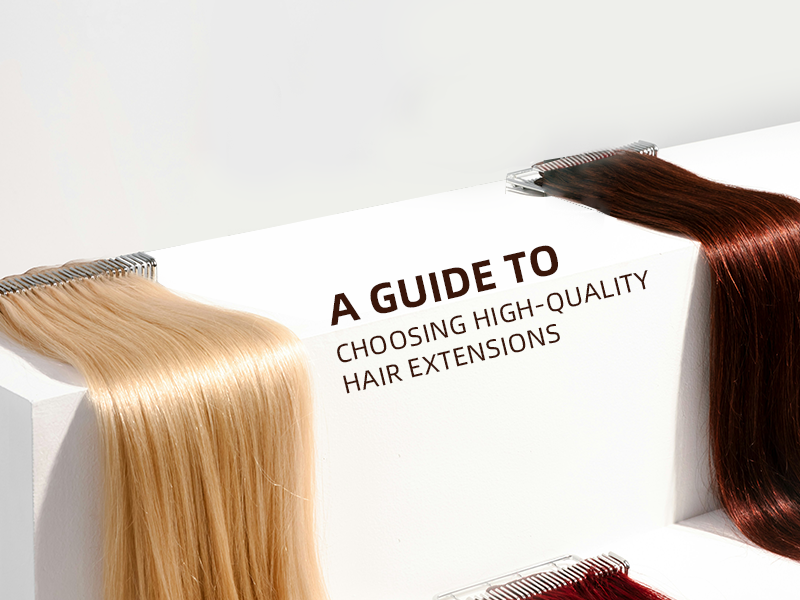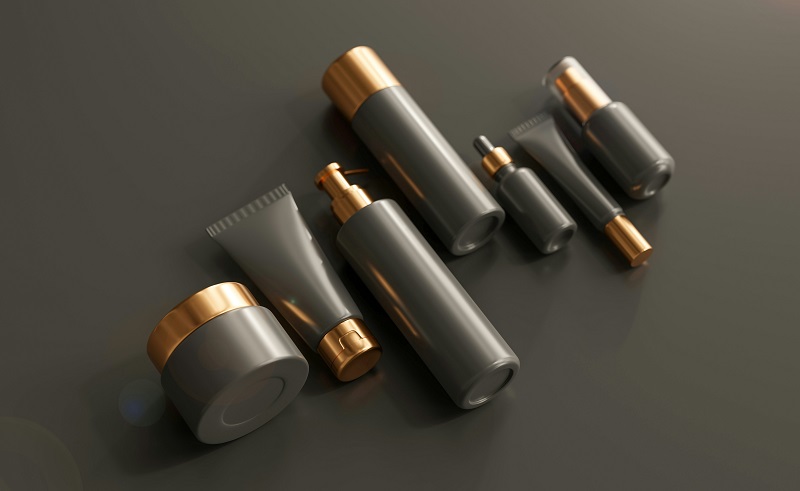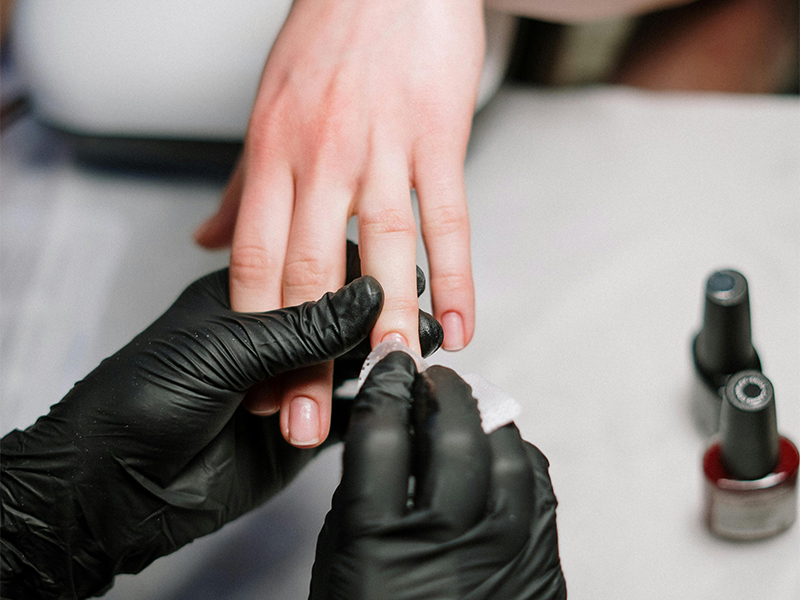China, Korea and Japan – a trio we refer to as the BeautyTriangle – are key markets for beauty not just within the confines of their own shores but also in Asia and beyond.
Together, they are expected to drive much of the beauty category growth over the next few years, their innovation and trends influencing attitudes and behaviours throughout the world.
It is for these reasons that understanding the needs and motivations of women in these three markets is vital for players in the beauty category to aadevelop value propositions that truly resonate with specific consumer segments in each of these geographies.
Ipsos specialists in the beauty category have studied the fundamental needs of women as well as the impact of the corona virus on the role of beauty for women in the Beauty Triangle, and they explore some of the most prominent themes.
SHARED COMMONALITIES
While the different histories and cultural heritage of each of these three markets means a different starting point for women in these economies, they are all witnessing an accelerated evolution of their roles in society and associated expectations, and so share commonalities in a few areas.
The first common area is technology, which has played a significant role in feeding this accelerated change in the role of women and has also facilitated increased interconnectivity among these three markets – socially, economically and culturally: Japanese women watch Korean dramas, go crazy for K-pop bands and buy Korean pimple patches in bulk, while Chinese tourists fly to Osaka to purchase Japanese luxury goods, and Korean and Chinese youth are captivated by Japanese manga and gaming. These dynamics are not standing still; rather, they are constantly shifting and evolving.
Ipsos anticipates that cultural interconnectivity will be amplified, especially as evidence suggests a substantial increase in time spent on social media during lockdown. However, as, travel restrictions are likely to remain in place for some time, we might start seeing the emergence of more localised solutions to counter the lack of access to goods from abroad. An example of this is Shanghai’s May 5th Shopping Festival, where sales on Tmall, Alibaba’s B2C e-commerce platform, exceeded Rmb100 million ($14.14 million) within the first minute of the festival’s opening.
China’s C-Beauty had started making inroads in Japan and Korea, and was seen by some as the next biggest trend to impact the beauty world. In the short term, C-Beauty’s influence beyond its home market will likely be limited, as some blame China for the pandemic and anti-Chinese sentiments have emerged in certain quarters. Importantly, as the pandemic evolves into an economic crisis and consumers start to worry about their personal finances, discretionary expenditure on imported, non-essential products may be reduced. Conversely, perceptions of China as a country that managed to contain the pandemic more effectively than other nations may fuel national pride and therefore greater consumption of local products, enhancing the appeal of C-Beauty among Chinese women.
A second theme common across women in the Beauty Triangle is the continued importance of balancing inner and outer beauty. According to the research by Ipsos, 84% of women across China, Korea and Japan agree that inner self-balance is key to them feeling beautiful, compared to 71% that mentioned appearance.
Ipsos believes this will become a greater priority at a time when lifestyles are being fundamentally challenged. While women’s participation in the labour market in these three powerful economies already exceeds 50%, they now have home-schooling their children as an additional responsibility. Bearing in mind that these are still very traditional societies, it is not difficult to imagine the disproportionate burden that life in lockdown has placed on women. With this increased pressure, being at ease with oneself and emotionally balanced is likely to become even more important.
This leads to a third area of commonality: the search for empowerment among women in the Beauty Triangle and the ssociated evolution of ‘beauty for others’ to ‘beauty for oneself’ in their quest for self-improvement and self-confidence. This evolution also likely gathered momentum as women spent more time at home and not socialising, particularly at the peak of the pandemic.
Women have adapted their beauty regimes to the new circumstances of lockdown, the continued popularity of Key Opinion Leader (KOL) or digital influencer videos and exercise tutorials on social media being testament to the fact that holistic beauty for oneself is at the heart of their motivations. However, this territory has been mostly ignored by the beauty industry to date – now is a good time to rethink.
DIVERSITY AMONG WOMEN
Although they share commonalities, brands must also be mindful that not all women in the Beauty Triangle are the same.
Understanding their diversity is key to succeeding in each of these hyper-dynamic economies. The research by Ipsos included a robust segmentation based on needs and motivations for beauty, which revealed six core segments.
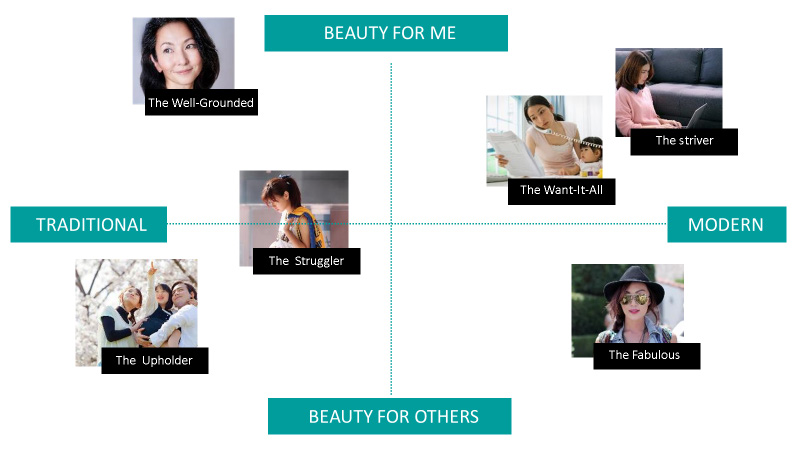
Take what we call “The Striver” for example. She admires women who are confident, think for themselves and continuously make the effort to learn, improve upon themselves and achieve their objectives. She pursues her own goals, gaining the knowledge and education required to make professional achievement possible. She is pushing hard to progress in her career but feels a lack of confidence and talent is holding her back. For her, beauty means inner beauty (positive traits such as being open to new experiences and ideas and having a charming personality) shining through on the outside in a healthy and natural appearance, which she aspires to achieve. The Striver is likely to have focused on the post-lockdown and spent the time in confinement gaining new knowledge and skills that will enable her to come out on top after the crisis.
There is another group, the “Want-it-all”. rational, competent and very busy, she is juggling to balance work, family and her own wants, needs and aspirations. She holds herself to high standards and wants to be admired as smart, accomplished and capable. She strives to maintain her beauty, as beauty is a tool that helps her get ahead and feel confident. She will want to ensure everything is perfect and in order in her life after the Coronavirus crisis: career undisrupted (or disrupted as little as possible), family and home (home-schooling and other domestic duties) well managed, and of course her physical appearance (she will keep exercising throughout and looking after her skin and hair at home in whatever way possible).
THE NEW NORMAL
In the context of the Covid-19 pandemic, the question arises as to whether the new normal will impact the role of beauty for these women going forward, as well as their underpinning needs and motivations. There’s evidence of behavior changes, of course. For example, usage of make-up is down due to women staying at home and wearing protective masks when venturing outside, but what about deep-seated motivations? How will those be impacted?
Studies by Ipsos have shown that while people change their behaviours in response to new circumstances, deep seated values and beliefs are likely to remain the same. If anything, extreme situations tend to make us rely more consistently on our core principles – a regression to what really matters. Therefore, the different groups of women we have identified in the Beauty Triangle are likely to remain and these profiles provide important guidance for brand owners.
MEANINGFUL NARRATIVES
Going forward, there are two broad but essential take-outs for players in the beauty industry aiming to win in the Beauty Triangle. The first is the need to focus on the core values driving women in these important markets who have to bear the brunt of domestic responsibilities while also playing an active role in their economies. Brand narratives must be relevant and empowering.
Cosmetics mustn’t be positioned as aids to correct imperfections, ageing mustn’t be something women dread. Beauty narratives mustn’t be about making women feel they are not good enough so that they buy the brand’s products. Instead, given the diversity of women in the Beauty Triangle, brand narratives must be about celebrating people and inclusion. Brands such as Dove or lingerie retailer Aerie have been very successful around the world by being more inclusive.
In this context, it is important to address beauty in its entirety, understanding this involves both inner and outer beauty. Bearing in mind the importance of the balance between inner and outer beauty for women in China, Korea and Japan, as well as the psychological impact of the crisis, this could represent an opportunity to develop relevant value propositions that tap on the duality of inner and outer beauty – not one or the other, but both.
The second imperative relates to staying close to these women, engaging them in an ongoing dialogue and making it easier for them to access the products and services they need. As already noted, Key Opinion Leaders (KOLs) are important sources of knowledge, advice and inspiration for women in the Beauty Triangle. Testimonials have always been an important feature of advertising for beauty brands but, while classic testimonials featured stars who had gained celebrity status in the arts or sports before being involved in testimonials, KOLs’ audience results from their role as digital/ social influencers and nothing else. Being seen as ‘people like them’ is exactly what makes them approachable, trustworthy and therefore influential.
A global Ipsos survey on beauty conducted in April-May 2019 shows that ‘experts’ from online videos and social media as well as magazines and other printed media are important influencers, second only to a woman’s entourage, that is her mother, friends, sisters and other family members. In China, outside of people they know, consumers rate online videos as most influential. In South Korea, people rely on online videos and Instagram/other photo sharing sites more than print.
While the independence and authenticity of such influencers has been the subject of much debate, these digital influencers are likely to remain critical touchpoints, particularly as women look at beauty in the context of new routines shaped by COVID-19.
Besides KOLs, easy access to products or services and facilitating decision-making will remain key post-Covid-19. The development of e-commerce affects the beauty sector and creates opportunities for enhanced personal connections between brands and consumers. But for cosmetics and fragrance, for example, technical challenges are clearly tougher than for other product categories because offline buyers are offered opportunities to touch and try the products on themselves which they won’t have online.
Ipsos consumer research conducted in June 2019 in the US, for example, revealed that, assuming they like it and its price is acceptable, 69% of consumers would definitely purchase false lashes that they would have only tried virtually, 45% for nail polish, 43% for blush. However, proportions shrink to as low as 28% for foundation and 29% for hair dye products.
It is important to remember that women cannot try all products offline in real conditions, either. For example, they can’t try several different shades of lipstick in a row before choosing one. This is where Augmented Reality online can really improve the experience of beauty shoppers. Tech start-ups like Perfect Corp and ModiFace (acquired by L’Oréal) have developed virtual try-on technology for beauty brands like Sephora, Estee Lauder, and L’Oréal. Both companies combine augmented reality and AI to let shoppers virtually try on different looks, while simultaneously collecting behavioural data for brands.
The Covid-19 pandemic has accelerated pre-existing trends and induced new behaviours around the world. Such changes have been particularly felt by women in the Beauty Triangle, where socio-cultural norms and economic realities have shaped their roles in society for generations. Their beauty related behaviours may have accelerated or changed but their deeply-rooted motivations are likely to remain. Given the role of beauty in these women’s lives, the size of the prize is significant for cosmetics brands that stay close to them in a relevant and meaningful manner.





